Photo: Kevork Djansezian/Getty Images

news
The Recording Academy goes to bat for music and the arts
Academy President/CEO Neil Portnow says the proposed budget cut affecting the National Endowment for the Arts is "shortsighted"
On March 16 the White House released its proposed 2018 budget, which slashes funding for more than 60 government programs. Disheartening to advocates for the arts, the budget cuts include the National Endowment for the Arts as well as the Corporation for Public Broadcasting, among others.
As staunch advocates for music and the arts in our daily lives, The Recording Academy plans to issue a strong request to Congress, asking them to maintain funding for the NEA. Recording Academy President/CEO Neil Portnow's full statement is as follows:
"Love of music and the arts brings us together, and celebrates the richness of American culture and our spirit of curiosity and creativity. Music and art serve as one of America's greatest exports, and support jobs for creators in cities, towns and rural areas across the country. The White House proposal to eliminate funding for the National Endowment for the Arts is shortsighted and alarming. The modest support that we provide to music and the arts is returned many times over, whether measured in jobs and economic impact, or sheer cultural enrichment and introspection. The Recording Academy will ask Congress to maintain funding for the National Endowment for the Arts and renew our commitment to America's creators."
Keep up with the latest advocacy news: Follow GRAMMY Advocacy on Twitter and like us on Facebook.

The Apollo Theater
Photo: Roy Rochlin/Getty Images
news
From Small Stages To The GRAMMY Stage: How Four Venue Professionals Became Presenters At The 2021 GRAMMY Awards Show
Operators and staff at the Station Inn, the Troubadour, the Apollo Theater and Hotel Café appeared during the 2021 GRAMMY Awards show to petition viewers for help—and promise an epic party for them if they do
The Recording Academy reimagined everything about the 2021 GRAMMY Awards show on a more intimate scale, and the choice of presenters was no different. When it came time to announce the Best Country Album winner, the person who appeared on screen wasn't a slick Nashville superstar, but a soft-spoken, older man who's unrecognizable to a global audience but beloved in the Music City. His name was J.T. Gray, and he grinned ear-to-ear on national TV.
In a segment recorded a month prior, Gray showed the camera crew around the Station Inn, the 145-person-capacity bluegrass venue he'd owned since 1981. Despite the room receiving almost no income for a year due to the live music industry shutdown caused by the COVID-19 pandemic, Gray was rosy about the future. "Getting to reopen the Station Inn, that's going to be a celebration like never before," he promised. "It's going to be a big party." He then announced the winner, Miranda Lambert, to the world. Gray was naturally quiet and reserved, a closed book. Not after that shoot, though.
"He was just beside himself the whole time," Jeff Brown, the Station Inn's marketing director, tells GRAMMY.com. "He just never believed it was happening. He just didn't believe that his little venue was being recognized on that kind of scale, that those many people in a place with the GRAMMYs and the Recording Academy's recognition actually paid attention. He just couldn't believe it." On Sunday, March 14, Gray astonishedly watched himself on CBS. The following Saturday, he passed away after a struggle with compounding health problems.
Gray might not get to attend the "big party" when things open up. But 9 million people heard his message.
<blockquote class="twitter-tweet"><p lang="en" dir="ltr">The Troubadour offers our deepest condolences to JT Grey’s family, friends, and those at <a href="https://twitter.com/stationinn1974?ref_src=twsrc%5Etfw">@stationinn1974</a>. JT created a special home for bluegrass, country music, and more in Nashville, TN. He leaves behind a beautiful legacy and will be missed by many.<a href="https://t.co/rGwZGuDoXK">https://t.co/rGwZGuDoXK</a></p>— Troubadour (@theTroubadour) <a href="https://twitter.com/theTroubadour/status/1374515380622794753?ref_src=twsrc%5Etfw">March 24, 2021</a></blockquote> <script async src="https://platform.twitter.com/widgets.js" charset="utf-8"></script>
For a year, venues worldwide have been hanging on by a thread: struggling to pay their rent, waiting in vain for federal aid, and given no clear finish line as to when they can reopen. That's why, with the Recording Academy's blessing, Executive Producer Ben Winston asked Gray, as well as representatives from the Troubadour and Hotel Café in Los Angeles and the Apollo Theater in New York City, to present at the 63rd GRAMMY Awards and talk about their economic struggles during the pandemic. Together, they sounded a shared refrain to the world: We matter to our communities, and we need help.
The venues that spoke their piece during the 63rd GRAMMY Awards were members of the National Independent Venue Association (NIVA). An assemblage of independent venue owners and promoters from around the country, NIVA formed directly in response to the 2020 lockdown. "We figured we'd better find a way to come together and lobby for federal assistance," Audrey Schaefer, a board member and the Communications Director for NIVA, tells GRAMMY.com. "Because otherwise, we're all going under."
The Steel Wheels at Station Inn in 2015. Photo: Erika Goldring/Getty Images for Americana Music via Getty Images
Last year, NIVA, along with the Recording Academy and other music organizations, lobbied Congress via the Save Our Stages Act and succeeded. On Dec. 27, the decree became the Shuttered Venue Operators Grant and passed along with the COVID relief package. "In that grant fund is $16 billion," Schaefer says. "For an organization that didn't exist before … nobody gave us any hopes of being able to secure that kind of funding. But we did. We got the law passed."
However, venues have not yet seen that money. "We understand that the applications will start at the beginning of April," she adds with relief in her voice.
In the meantime, Scheafer mulled over how best to convey to the world the existential crises venues face. "I was thinking that the GRAMMYs couldn't possibly be at the Beverly Hilton like it normally is—in a big ballroom—because we can't be together," she says. "I thought, 'What if the GRAMMYs were to have the award show, and instead of having all the performances under one roof, they were to have them in independent venues?'"
To try and give this idea legs, Schaefer reached out to Daryl Friedman, Chief Advocacy Officer of the Recording Academy's Advocacy division. "He said, 'Listen, Audrey, I think that's a great idea, but they have a million great ideas. So, let me take it to them and we'll see what happens,'" she recalls. Schaefer persistently followed up. "I kept asking Daryl, 'What do you think? What are you hearing?'"
But unbeknown to her, the Recording Academy and the production team were already independently planning to highlight independent venues and their employees as an advocacy initiative and add a personal moment to the broadcast. "And then I found out that, oh my gosh, they do want to do it," she adds with awe.
Billie Eilish at the Troubadour in 2019. Photo: Neilson Barnard/Getty Images for SiriusXM
Granted, the Recording Academy didn't agree to host performances at independent venues. But Schaefer calls the idea they decided to go with "so much better." Instead, venue professionals would take viewers on a tour of their workplaces, illustrating their value to their communities and why they desperately need help. Participants included the Station Inn's Gray; Rachelle Erratchu, the night manager at the Troubadour; Billy Mitchell, the tour guide and overall house cat at the Apollo Theater in Harlem; and Candice Fox, a bartender at the Hotel Café in Hollywood.
For Erratchu, the problem extends further than keeping the lights on at the Troubadour; the entire live music ecosystem is in trouble. "We need everybody else to survive so that we can survive," she tells GRAMMY.com. "If we don't exist and all the other venues across the country don't exist, the tour circuit as we know it and have relied on it for decades won't exist anymore."
For Billy Mitchell, the Historical Tour Manager and overall global representative of the Apollo Theater who has earned the title of "Mr. Apollo," his job isn't a means to an end; he lives and breathes it. Mitchell's time at the Apollo began in 1965 when he ran errands for James Brown and his band. During the telecast, Mitchell relates a funny story of how the Godfather of Soul sent him all the way home to the Bronx to get his report card, threatening to put his job on ice if he didn't get better grades.
COVID forced the Apollo to temporarily furlough some its staff. To be forced to stop, it was heartbreaking, to be honest with you," Mitchell tells GRAMMY.com. "I give tours to people from all over the world, and they're unable to visit because of COVID restrictions and things like that." While the not-for-profit has offered digital programming in the meantime, most of it has been free as not to burden fans. Thankfully, at press time, all staff members have returned full-time.
Billy Mitchell at the Apollo Theater in 2009. Photo: Jemal Countess/WireImage via Getty Images
The Apollo has been lucky, in a sense; corporate and private donations have kept it afloat. Still, they're not out of the woods yet. "Donations are needed so that when we do reopen, we can pump out those great shows and bring back our staff," Mitchell says. "We want to bring back our staff as soon as possible."
In the clip played during the 2021 GRAMMY Awards show, Mitchell addressed viewers from the empty audience. "We miss our audience and we can't wait until our doors open up again," he says. "We just can't wait."
Candice Fox, a bartender at Hollywood's Hotel Café, believes there will be an outpouring of activity at her workplace once it's safe again. "I like to believe people are going to want to make up for lost time," she tells GRAMMY.com. "I know that people are itching to perform. People are so excited to experience that exchange of energy again. So, I think it's going to explode."
In line with Erratchu's thoughts on the overall music ecosystem, Fox notes that Katy Perry cut her teeth at the 65-capacity room on Cahuenga Boulevard. "She wasn't the big pop star she is now; she was just a girl with a guitar," she says. "So many artists' careers and the GRAMMYs couldn't exist without small, independent venues like the Hotel Café because you've got to start somewhere." In her clip, Fox ruminates on the regulars she's missed for a year, pouring a Boddingtons and mixing an Old Fashioned to an array of empty stools.
Sister Sparrow and the Dirty Birds at Hotel Café in 2015. Photo: Christopher Polk/Getty Images
At the end of every venue vignette, each venue representative announced the winner of their assigned categories: Best Country Album for Gray (Miranda Lambert's Wildcard), Best Pop Solo Performance for Erratchu (Harry Styles' "Watermelon Sugar"), Best Rap Song for Billy Mitchell (Beyoncé's and Megan Thee Stallion's "Savage Remix") and Album Of The Year for Fox (Taylor Swift's folklore). All four were thrilled to appear and encourage viewers to support their workplaces—whether by donating directly, paying for a livestream or purchasing a T-shirt.
That way, the lights at the Station Inn, the Troubadour, the Apollo and Hotel Café can flare up again, ensuring these cultural hubs don't become figments of the past. And if you want to know how memorable the inevitable "COVID is over" parties will be, just look at Gray's blazing smile during the GRAMMYs.
"I can probably count a very [small] number of times that I've seen him truly smile," the Station Inn's Brown reflects. "But truly smiling—that's what he was doing here."
Click here to support the Station Inn.
Click here to support the Troubadour.
Click here to support the Apollo Theater.
Click here to support Hotel Café.
Click here to support NIVA.

Photo: Robyn Beck/AFP via Getty Images
news
Election 2020: Artists Speak Out On The Importance Of Copyright, Musicians' Rights And Relief Efforts This Voting Season
GRAMMY.com spoke to a number of artists and musicians about some of the most pressing issues impacting the music community this election cycle
This week, Americans will decide on the next president of the United States, and musicians across the country are among the hundreds of millions of lives that will be impacted by the outcome. In a recent article, which cited industry executives on both sides of the aisle, Billboard broke down what's at stake for musicians in this upcoming election cycle, underscoring copyright as the most important policy issue in the music business right now. Since the copyright industries collectively contribute more than $1 trillion dollars annually to the Gross Domestic Product, many members of the music community might therefore assume this to be the big-ticket issue that could help them decide between candidates. Unfortunately, though, it's not that simple.
"While there is no shortage of issues that differentiate Trump and Biden, music is generally not one of them," Daryl Friedman, the Recording Academy's Chief Advocacy Officer, told Billboard. The fact is, both Joe Biden and Donald Trump share very similar views on copyright and have pro-music policies on their records, making it very difficult for undecided voters in the music community to choose a candidate based on copyright policy alone.
Ahead of the 2020 Election, GRAMMY.com spoke to a number of artists and musicians about some of the most pressing issues impacting the music community this voting season.
Pandemic Music Rights
Many musicians and industry professionals show tremendous concern over the handling of the COVID-19 pandemic, which has directly impacted the music industry in drastic ways. In fact, when Vice Presidential candidate Kamala Harris took to Instagram Live with artists Miley Cyrus, Billie Eilish and Selena Gomez in October, the pandemic was central to their conversations. The inability to tour has proven particularly devastating for the careers of indie musicians, and the same goes for indie music venues, which are struggling to survive
"The lack of a national strategy has not just meant live music venues across the country being shut down, but many having to shut their doors permanently," one Los Angeles music venue manager tells GRAMMY.com. "Many big venues will be fine, but what does that mean for small businesses?"
The Recording Academy has worked closely with lawmakers and policy makers, including in the Trump Administration, on relief efforts to support the music ecosystem, and it continues to advocate for a substantial relief package—inclusive of funding for musicians, venues, studios and other music small businesses affected by the pandemic.
According to Ruth Vitale, CEO of CreativeFuture, piracy has also worsened since the pandemic, as Americans find it increasingly more difficult to pay for streaming services. "In a time when few can work, piracy cuts into the already reduced legitimate revenue streams from our creations, exacerbating our economic challenges," she explains in a letter to Joe Biden last month.
Indie pop duo Flora Cash expresses similar concerns for the music industry amid the pandemic. "The music industry as a whole is in a really tough spot right now due to the situation around COVID-19, and some real help is going to be needed, especially for live music venues that have not been able to open for almost the entirety of 2020," they told GRAMMY.com in a joint statement.
Music Rights
When asked what issues matter most to her this voting season, GRAMMY-nominated songwriter and R&B artist Victoria Monét addressed musicians' rights. "There are [policies in place] that don't reflect the way today's music is consumed or accurately accommodate creatives in general," she tells GRAMMY.com. "Among many other political issues, fair and equal pay for songwriters is very important to me."
Monét's point is supported by many musicians who argue that the payout to artists, songwriters and producers from streaming services such as Spotify and Apple Music is too low, especially given the significant role the copyright industry plays in our economy.
"The core copyright industries are an important economic driver for our country, employing 5.7 million Americans and contributing more than $1.3 trillion to the Gross Domestic Product," CreativeFuture's Vitale shares in her October letter to Biden. "[This is] more than aerospace, agriculture, or pharmaceuticals."
Read: How ONE Musicfest Is Engaging Voters In 2020: "The Underlying Message Is To Get Folks To The Polls"
Musicians' rights are a hallmark of the Recording Academy's advocacy efforts. Just recently, Academy Trustee Yolanda Adams testified in front of the U.S. Senate Judiciary Committee on the Digital Millennium Copyright Act, and earlier in 2020, the Academy's Chair and Interim President/CEO Harvey Mason jr. spoke to the same committee about the importance of establishing a terrestrial radio performance right for artists. The Academy will continue to advocate for fair pay for artists and creators in a more inclusive and modern copyright system.
Fortunately, both candidates have expressed similarly strong views on the issue of copyright. In 2018, President Trump signed into law the Music Modernization Act (MMA)—the most significant update to music licensing in a generation, with significant support from the Recording Academy and its members. President Trump also recently signed the USMCA, which included a number of substantial pro-copyright modifications.
And as Billboard recently reported, Vice President Biden has a long and verifiable track record in supporting pro-copyright policies, citing his eight years as chairman of the Senate Judiciary Committee. "Look, piracy is outright theft," Biden said in 2011. "People are out there blatantly stealing from Americans - stealing their ideas and robbing us of America's creative energies. There's no reason why we should treat intellectual property any different than tangible property." (The Recording Academy honored Biden at the 2011 GRAMMYs on the Hill Awards in Washington, D.C.)
Delving further into the candidate's track records reveals that Joe Biden was behind the American Recovery and Reinvestment Act (ARRA) of 2009, which was responsible for millions of dollars going back into the pockets of musicians and arts organizations that were impacted by the economic crash of 2009. "ARRA supplemented my income so that I could continue Chorus America," GRAMMY-winning choral conductor Peter Rutenberg tells GRAMMY.com.
Despite widespread criticism of the Trump Administration's handling of the pandemic, they haven't left musicians completely empty-handed either. At the urging of the Democrat-controlled House of Representatives, the Coronavirus Aid, Relief, and Economic Security (CARES) Act of 2020 , which was signed by President Trump, took steps to help musicians combat the economic challenges spurred by the pandemic by temporarily allowing gig workers to apply for unemployment assistance.
Funding The Arts
As for the classical community, one of the primary concerns for voters is the funding of the arts. "I am deeply concerned for the arts in America," Stephen Williamson, principal clarinetist for the Chicago Symphony Orchestra, tells GRAMMY.com. "We are usually the first genre to be cut from schools and/or underfunded by the government." "I sincerely hope that our country sees the need for the arts in the enrichment of the human spirit ... something that all people are truly craving in light of this pandemic."
The Recording Academy annually submits testimony to the House of Representatives and Senate in support of additional funding for the National Endowment for the Arts (NEA). As part of Congress' response to the COVID-19 pandemic, the Academy successfully advocated for the establishment of a $75 million supplemental fund for the NEA to help struggling creators as part of the CARES Act.
Your Voice Matters
From Black Lives Matter to the environment, the list of issues that matter to the music community is vast. Ultimately, Americans must decide for themselves what issues matter most and why. No matter who you support, musicians and music-lovers alike are encouraged to get to the polls on Election Day (Tuesday, Nov. 3) if you haven't yet cast your ballot via the #MusicVotes campaign. You can visit the Recording Academy's election page for voting resources and additional information to make your vote matter.
"It's important for everyone, not just musicians, to get out and vote," GRAMMY-nominated film composer Bruce Broughton tells GRAMMY.com. Broughton, who is known for such film scores as Tombstone, Young Sherlock Holmes and Moonwalker, believes there is more at stake in this election than ever before. "This year, the choice is big, and the repercussions of that choice will be bigger. I don't see anyone not being [affected] by whichever side wins this year."
Are You Ready To Vote? Design Your Voting Plan With #MusicVotes Campaign

AJ Haynes
Photo: Dylan Glasgow Guice
news
Seratones' AJ Haynes On Working With Brad Shultz, Reproductive Rights & Advocacy In Music
The Seratones frontwoman talks to the Recording Academy about her advocacy work around women's reproductive rights
AJ Haynes' quest to empower women offstage began in college after she finished playing a gig. The Seratones frontwoman was hanging out after performing at a women’s clinic with her former cover band when she found herself curious about what the healthcare providers did there. Once she had an overall picture of everything the clinic provided for women, she felt enthralled.
"I started working [there] within the week, and I've worked there off and on for about 10 years," she said in a recent interview with the Recording Academy.
Not that the powerhouse vocalist has stopped performing: her soul-rock band released their sophomore album, Power, just last August. The group's latest is produced by Cage the Elephant’s Brad Shultz, whom Haynes calls "a bolt of electricity."
"Working with him was truly a dream," she says. "There’s a certain honesty and an immediacy he really knows how to channel into song."
<style>.embed-container { position: relative; padding-bottom: 56.25%; height: 0; overflow: hidden; max-width: 100%; } .embed-container iframe, .embed-container object, .embed-container embed { position: absolute; top: 0; left: 0; width: 100%; height: 100%; }</style><div class='embed-container'><iframe src='https://www.youtube.com/embed/HLsNLn4JruE' frameborder='0' allowfullscreen></iframe></div>
But you’ll still find Haynes at Hope Medical Center, in her hometown of Shreveport, La., whenever she’s home from tour.
Haynes has been advocating for women's rights to seek abortions in Louisiana alongside the clinic as the state prepares for a court case that can possibly mean its closure. Obtaining an abortion in the state is legal thanks to Roe vs. Wade, but new legislation may make it even harder to get, as there are only three abortion clinics in Louisiana. Doctors performing abortions must obtain admitting privileges that are often difficult to get from nearby hospitals. A court case to be held on March 4 by the Supreme Court will "hear the clinic's challenge to [the] tough Louisiana law placing new restrictions on doctors who perform abortions. If the law goes into effect, the clinic may have to close down," reports Reuters.
For the singer, her identity as a musician and her identity as an advocate for reproductive rights have become intertwined. Prior to the March 4 court case, and on a pit stop from the Seratones' ongoing tour, Haynes spoke to the Recording Academy about the work she’s been doing to help women learn about their reproductive rights. This interview has been edited and condensed for clarity.

Photo: Timothy Kuratek/CBS via Getty Images
news
Recording Academy Advances New Membership Model, Inviting This Year's Class
Membership VP Laura Segura Mueller on how the Academy is "committing to fostering diversity and inclusion while encouraging the music industry to reexamine and reinvent their own long-standing practices"
Over 1,300 highly-qualified music professionals from wide-ranging backgrounds, genres and disciplines woke up to good news this morning, as the Recording Academy begins extending membership invitations to its new class today. This monumental moment signifies a profound shift not only for the careers of the hand-picked music makers, but for the music industry in general.
Last November, the Academy revolutionized its new member submission process for the first time in over 60 years, implementing a community-driven membership model. Today, a new class of highly accomplished music professionals, recommended by their peers, receive an invitation to join the Recording Academy. We spoke with Laura Segura Mueller, Vice President of Membership & Industry Relations at the Recording Academy to gain some insight on this important step forward.
"The Recording Academy is honored to announce our inaugural membership class of 1340 qualified music creators and business professionals. The 2019 class is comprised of music creators and professionals from across the music industry and their talents and backgrounds span many genres, crafts, ethnicities, genders, ages, locations and professions. As a result of meaningful recent changes to our member recruitment process, the class is more representative of the diverse voices, modes of expression, and excellence within the music industry, as compared to the data reported in the USC Annenberg Inclusion Initiative studies released in 2018 and 2019."
<blockquote class="twitter-tweet" data-lang="en"><p lang="en" dir="ltr">I’m now an official member of <a href="https://twitter.com/RecordingAcad?ref_src=twsrc%5Etfw">@RecordingAcad</a><br>Excited to contribute to the culture <a href="https://t.co/oA5AvgKUvX">pic.twitter.com/oA5AvgKUvX</a></p>— LIΔNΔ ВAΝK$ (@LianaBanks) <a href="https://twitter.com/LianaBanks/status/1136325084954734592?ref_src=twsrc%5Etfw">June 5, 2019</a></blockquote><script async src="https://platform.twitter.com/widgets.js" charset="utf-8"></script>
The Annenberg studies revealed a very lopsided gender breakdown, reporting that across the Billboard chart data sources, women only account for 21.7 percent of artists, 12.3 percent of songwriters, and 2.1 percent of producers. These figures stunned much of the music industry and provide a stark backdrop for the Recording Academy's inaugural class.
Looking at the numbers, 49 percent of the Recording Academy class are females, 41 percent are from traditionally underrepresented communities, and 51 percent are 39 and under. The Recording Academy's current membership is 26 percent females, 24 percent traditionally underrepresented communities and 29 percent are 39 and under. While the improvement is clear, the work is just beginning.
2019 MEMBER CLASS STATS
"When you compare these figures to what was reported in the 2019 Annenberg study, it’s clear that our new member class shows a marked improvement," said Segura Mueller. "We are deeply committed continuing this positive trend for years to come."
"With such dire statistics industry-wide, we will face challenges with future new member classes if not enough women and people of color are being hired, mentored, and have access to opportunities to lead and excel. The industry-wide change we need will only be achieved when new voices are encouraged to rise through the ranks," she said, emphasizing the need for partnership with the industry as a whole.
<blockquote class="twitter-tweet" data-lang="en"><p lang="en" dir="ltr">Y’all .... I’m Officially apart of the <a href="https://twitter.com/RecordingAcad?ref_src=twsrc%5Etfw">@RecordingAcad</a> Thank you to everyone at the Academy for your Love and support!! It’s Lit!! <a href="https://t.co/5rrjF3q1t7">pic.twitter.com/5rrjF3q1t7</a></p>— ASIAHN (@IamAsiahn) <a href="https://twitter.com/IamAsiahn/status/1136088444302577664?ref_src=twsrc%5Etfw">June 5, 2019</a></blockquote><script async src="https://platform.twitter.com/widgets.js" charset="utf-8"></script>
Last year marked the start of a series of turning points for both the Recording Academy and the music industry. As both began to take a closer look at itself, the picture of diversity and inclusion in today's music world snapped into focus, revealing a fundamental imbalance.
In response, the Recording Academy and committed industry leaders took action, organizing a Task Force chaired by Tina Tchen to examine and better understand the barriers and biases affecting underrepresented voices in the music industry and Academy, including women and people of color.
<blockquote class="twitter-tweet" data-lang="en"><p lang="en" dir="ltr">this made my entire week, i’m officially a <a href="https://twitter.com/RecordingAcad?ref_src=twsrc%5Etfw">@RecordingAcad</a> voting member. i always believed if you wanted to make a change you had to go about it the right way | <a href="https://twitter.com/hashtag/GRAMMYs?src=hash&ref_src=twsrc%5Etfw">#GRAMMYs</a> | <a href="https://twitter.com/hashtag/WeAreMusic?src=hash&ref_src=twsrc%5Etfw">#WeAreMusic</a> | <a href="https://twitter.com/hashtag/GODISTHEGREATEST?src=hash&ref_src=twsrc%5Etfw">#GODISTHEGREATEST</a> | <a href="https://twitter.com/hashtag/PlatterBoyz?src=hash&ref_src=twsrc%5Etfw">#PlatterBoyz</a> <a href="https://t.co/LnY0Xuvkcc">pic.twitter.com/LnY0Xuvkcc</a></p>— Poppa Foster (@BassmanFoster) <a href="https://twitter.com/BassmanFoster/status/1136058822169174018?ref_src=twsrc%5Etfw">June 4, 2019</a></blockquote><script async src="https://platform.twitter.com/widgets.js" charset="utf-8"></script>
Recording Academy President/CEO Neil Portnow reflects, “I thank Tina and all of the participants for their hard work and follow through on the Diversity & Inclusion Task Force. The task force was key in reviewing and helping us get this new member model off the ground after many years of internal development. It is through an industry-wide dedication on this scale that we see true transformation.”
Ultimately, the move to a yearly membership model cycle, creates a unique opportunity to celebrate the talented individuals who make up the music community and recognize the creative endeavors that enable it to thrive. The new model also more closely reflects the peer-driven process behind the GRAMMY Awards, as Kelley Purcell, Senior Director of Member Outreach points out.
"Membership is the lifeblood of the Recording Academy and a privilege we strive to uphold," says Purcell. "This evolved model puts the power in the hands of music professionals to recommend who among their peers they think should be a member and will help ensure the Academy represents the breadth and depth of talent synonymous with the recording industry. The GRAMMY Awards are already renowned for being a peer-awarded honor, and now our membership model also reinforces that peer-driven commitment to excellence."
The class of invitees will have until voting ballot deadlines to accept their invitation and participate in the 62nd GRAMMY Awards, set to take place Jan 26, 2020 in Los Angeles.
Our new peer-driven membership model is just one more way that the Recording Academy is evolving while also encouraging other industry companies to reinvent their own long-standing practices," said Segura Mueller. "We are nurturing a more inclusive organization for our members today and for generations to come."
